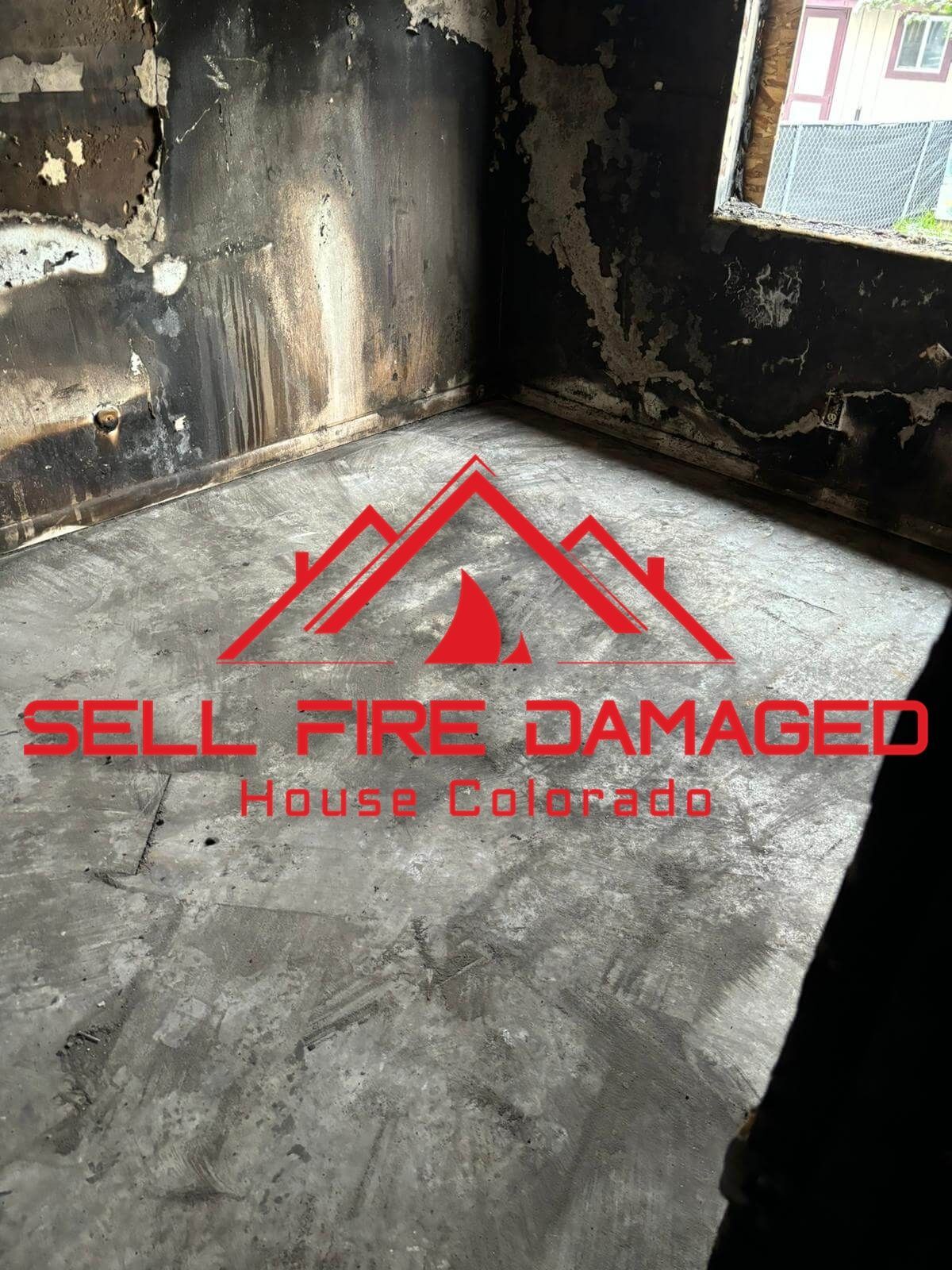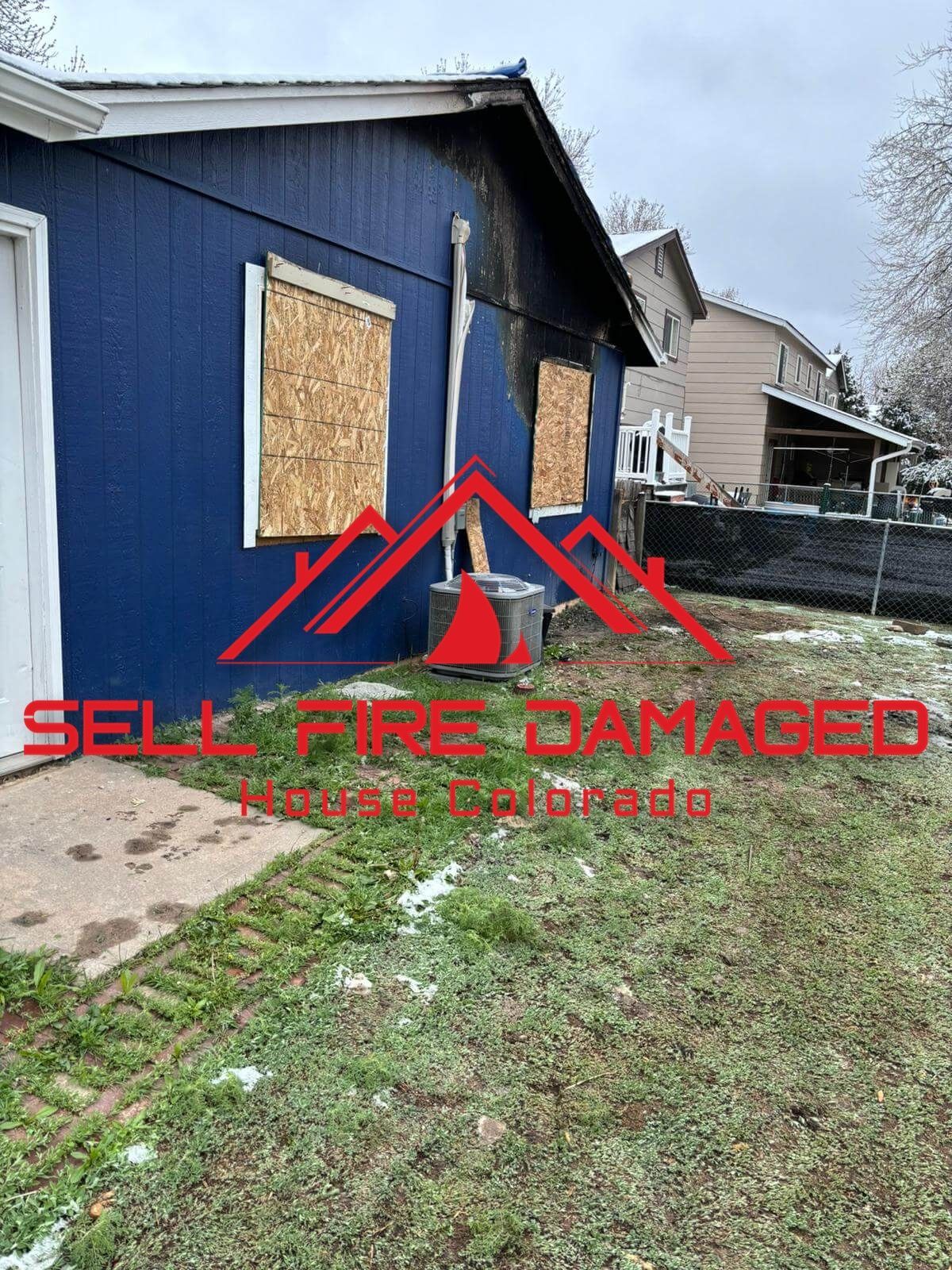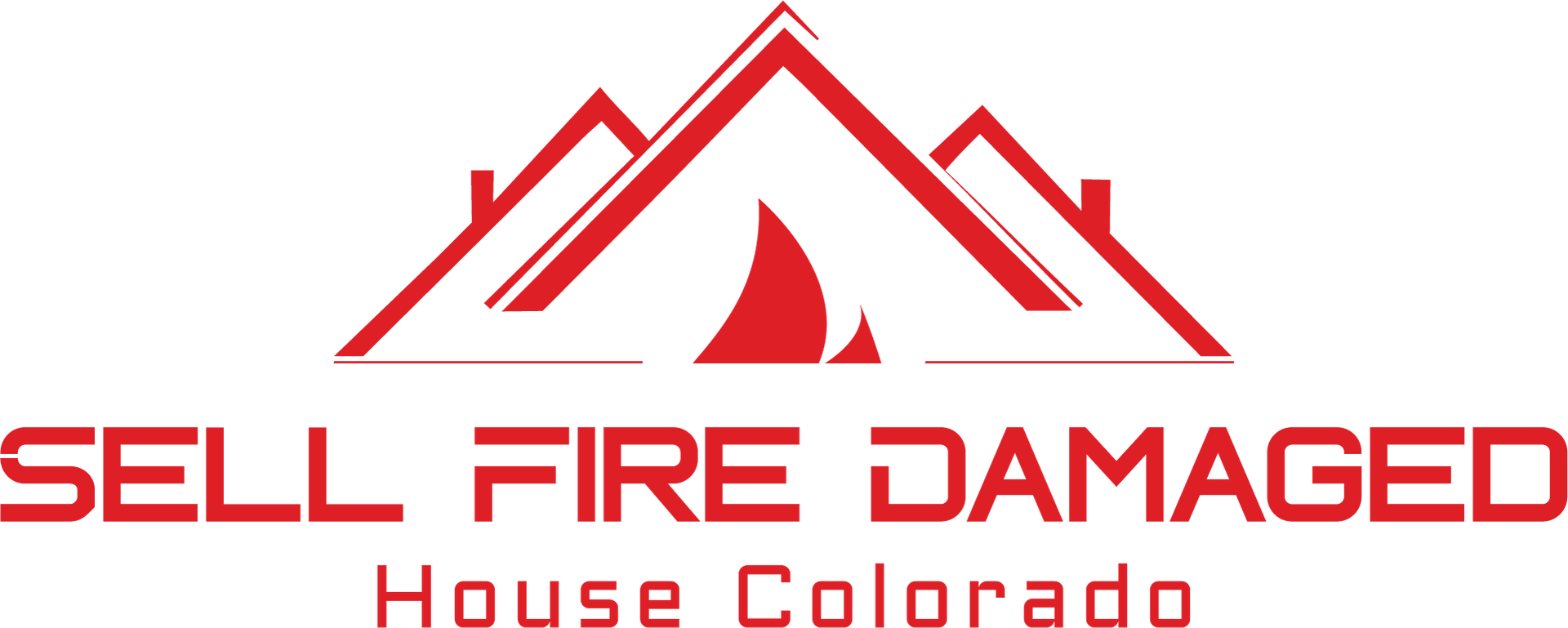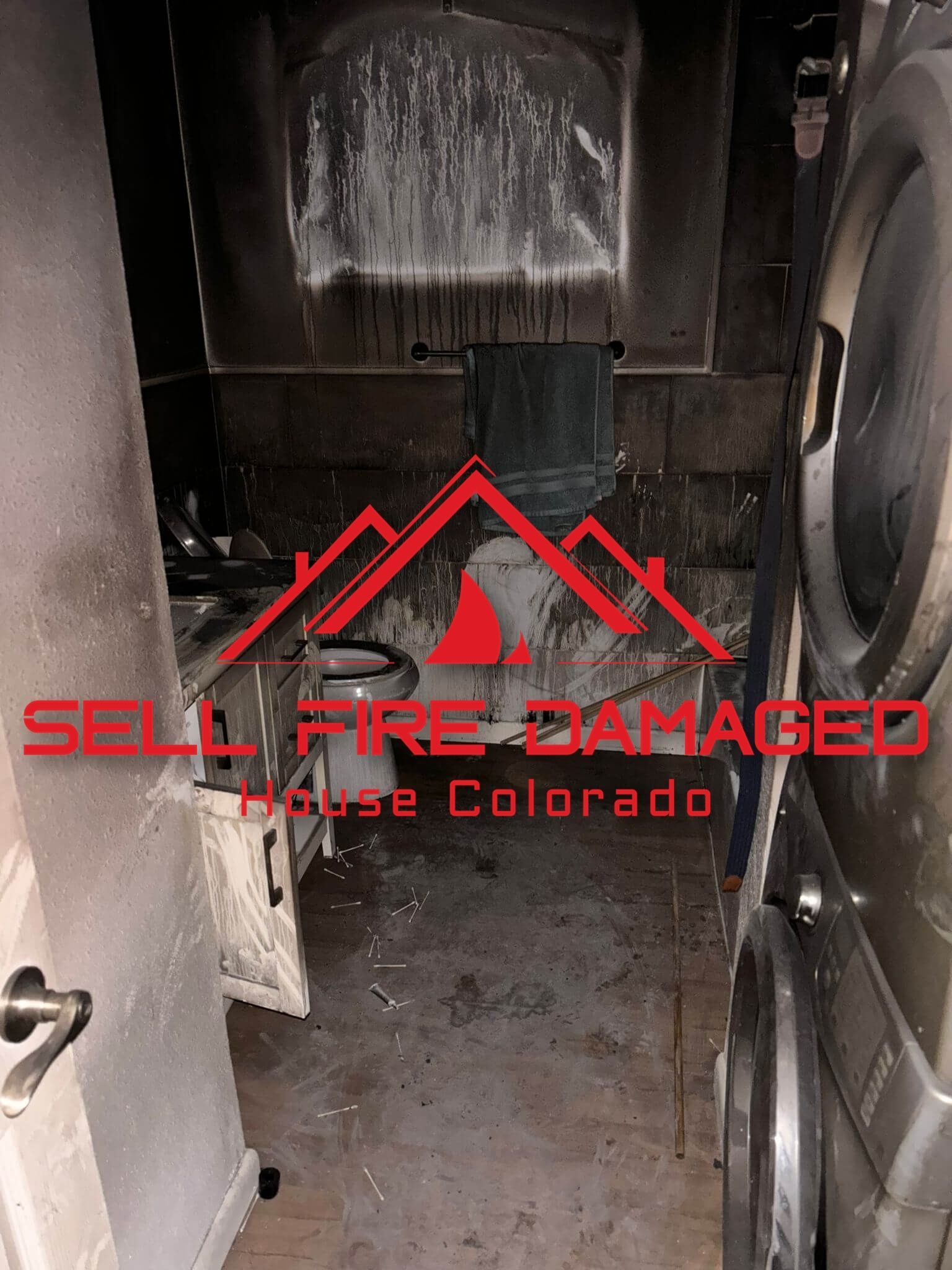How Does Fire Damage Affect Property Values In Colorado?
Published on December 24th, 2024
Alexander Rivera
AUTHOR
Free Offer Form
A house fire can impact a property's value on the real estate market through factors like damage, repairs, and the buyer's considerations.
We'll discuss the impact of fire damage on attribute values, communities, and economies, affecting many homeowners, real estate professionals, insurance companies, and policymakers.
We will answer "Does a house lose value after a blaze?" and disaster mitigation.
Fire Damage and Property Value In Colorado: A General Analysis
This section explores the correlation between fire damage and land value. It's essential to understand the process of selling a fire-damaged house to investors or homeowners.
Defining Property Value in the Context of Fire Damage
Land value or the estimated monetary worth of real estate can change after wildfires, structural fires, or other fire-related incidents.
When selling a house after a fire, homeowners can receive a generous cash offer for their assets, reflecting the decreased value caused by the extensive damage.
If you're having trouble finding a cash buyer, home insurance companies will sell your house via a cash offer. They will handle the closing costs and make the selling process easier.
Pre-Fire Value: This is the property's estimated worth before the fire. It considers the area's location, size, condition, and comparable sales.- Post-Fire Value: Post-fire land value typically has a lower price due to necessary repairs and rehabilitation, ranging from minor smoke damage and water damage to destruction. However, you can get a fair price for your property after repairs.
- Repaired Value: The property's value may recover post-fire repairs if you restore it to pre-fire condition. This will help you sell it for a fair cash offer.
- Market Perception: Market perception significantly impacts a property's resale value, with potential buyers hesitant to purchase a fire-damaged home, even after it's fully repaired.
- Insurance Coverage: Insurance coverage significantly influences value in fire and smoke damage scenarios, with well-insured properties recovering more pre-fire value. Homeowners insurance should be able to provide or request a fair cash offer moving forward.
- Location and Demand: The local real estate market's conditions and demand significantly impact land value post-fire damage, whether you sell the home as-is or after repairs.
Causes of Fire and Their Impacts on Property Value
Common causes of fires include natural disasters, wildfires, and wildfires with varying severity and impact on land value. These can all affect the cash offer you receive for a fire-damaged house.
- Wildfires: A wildfire can lower potential cash offers due to increased blaze and smoke damage risk.
- Structural Fires: Structural fires caused by accidents, electrical faults, kitchen mishaps, or arson can result in diminished property value before the homeowner can repair the house.
- Arson: Arson is the intentional burning of assets or structures, causing significant damage and potentially reducing its value. Contact a fire investigator if you suspect arson. Making repairs can improve the cash offer you receive.
- Electrical Problem: Electrical fire due to faults like outdated wiring, overloaded circuits, or equipment failures can cause fires and impact property value. Conduct an HVAC inspection if the fire was caused by poor ventilation or a faulty heater.
- Natural Disasters (e.g., Earthquakes, Hurricanes): Natural disasters like earthquakes and hurricanes can cause severe damage, including secondary fires, power outages, and water damage, significantly impacting attribute values in disaster-prone regions.
- Community Infrastructure: Firefighting infrastructure, like nearby stations and hydrants, can mitigate fire damage, potentially leading to higher land values due to the perceived safety of the area.
NOTE: Even if you plan to sell your house as-is, it's best to keep detailed records from the beginning. It is important to disclose fire damage when selling a house, whether the event was recent or years ago. Being open about the repair job informs future buyers that they're buying a remodeled property with new components. After that, you can set a closing date.
The Immediate Aftermath: Short-Term Impacts on Property Values
The immediate aftermath of a blaze can significantly impact a property's value, influenced by factors like the following.
- Contact a fire marshal for evacuation
- Damage assessment by the insurance company
- Insurance claim after the house fire checklist
- Market perception
- Economic and community effects
- Emergency response and evacuation status
- Investor opportunities
Land values may decline initially due to damage but recover over time.
After contacting a disaster relief organization, you can only enter the residence after the fire department confirms it is safe.
Inform utility providers about the blaze and request emergency shut-off service before beginning to repair the structure.
Rehabilitation of Fire-Damaged Properties and Property Values IN Colorado
The section investigates the link between the rehabilitation of fire-damaged residences and their real estate values.
The Role of Fire Insurance in Property Value Restoration
Homeowners insurance is vital for property value restoration, providing financial protection against losses from fire-related incidents. It covers structural repairs, replacements, temporary housing and living expenses.
It expedites all the repairs, prevents further property damage, and maintains property value.
The Costs and Process of Property Restoration
Conducting a thorough assessment to determine the potential cost of restoring fire damage will help you plan for proper repairs and renovations.
Property restoration costs after fire damage vary based on damage extent, house type, local building codes, and material quality.
Expect an assessment from the property insurance company, immediate cleanup, structural and plumbing repairs, HVAC system repairs, interior restoration, smoke and soot cleanup, and content repairs.
You may also need permits and additional safety measures.
- Initial Assessment: The rebuilding process begins with the insurance company, which will assess the damage. This assessment will help you estimate the cost of rebuilding.
- Insurance Claims Process: House owners often file an insurance claim to cover the full value of restoration costs. An insurance adjuster from your insurance company determines the coverage amount based on the damages.
- Selecting Contractors: Hire a reputable contractor experienced in restoration for repairs. Ensure you choose a licensed, insured, and experienced contractor.
- Planning and Permits: Contractors develop a detailed restoration plan, which may include obtaining necessary permits from the local authorities.
- Restoration Work: The restoration work begins. This involves repairing structural damage, addressing interior issues, thorough cleaning, and restoring the fire-damaged house to its pre-fire condition.
- Inspections: Local building inspectors may conduct inspections at various stages of the restoration process to ensure compliance with codes and safety standards.
- Final Cleanup and Inspection: After complete restoration work, a final cleanup and inspection are conducted to ensure the house is habitable and free from fire-related hazards.
- Occupancy or Sale: Once the property is fully restored and passes all inspections, it can be reoccupied or put on the market for sale or rent.
NOTE: Determine the home's replacement cost by hiring an appraiser or using an online cost estimator. After finding a replacement cost, compare it to the remaining balance on the mortgage.
The Impact of Rehabilitation on Property Values
Rehabilitation after fire damage enhances land values by improving the home's curb appeal, meeting building codes and safety standards, and offering a safer investment.
It also increases resale potential. The impact of rehabilitation varies depending on location, market conditions, and buyer preferences.
Long-Term Impact of Fire on Property Values IN Colorado
Fires significantly impact land values, affecting real estate markets and communities for years. Understanding fires' effects is crucial for homeowners, investors, policymakers, and the public.
Effect of Stigma on Property Values After a Fire
A negative perception of a property's fire damage history can impact its value, reducing buyer interest and appraisals.
To mitigate this, owners should ensure rehabilitation, transparency, professional real estate appraisal, and educate buyers about the property's repairs.
The Role of Location and Fire Risk in Determining Long-Term Property Values
Location and blaze risk significantly influence long-term land values, particularly in areas prone to wildfires or historical blaze incidents.
Insurance costs in high-risk areas can also negatively affect land values. Blaze mitigation measures, community preparedness, market sentiment, and climate change considerations also impact land values.
Practical Considerations When Buying a Fire-Damaged Property IN Colorado

The section emphasizes assessing damage, managing restoration costs, and resale values when buying fire-damaged homes to transform them into valuable assets.
Before deciding to find and invest in fire-damaged properties, it's crucial to thoroughly assess the extent of damage and potential renovation costs.
Identifying a Good Deal: Buying a Fire-Damaged Property Below Market Value
To buy a fire-damaged home below market value, conduct a thorough inspection, estimate potential repair costs and be aware of local regulations.
Determine the potential resale value and create a realistic renovation budget.
Potential Risks of Buying Fire-Damaged Properties
It's important to understand the potential risks when investing in fire-damaged homes like the following.
- Hidden damage
- Safety hazards
- Financial investment
- Insurance challenges
- Financing obstacles
- Regulatory compliance
- Environmental concerns
- Overleveraging
Financing Options for Purchasing Fire-Damaged Properties
Due to their unique risks and conditions, fire-damaged homes can be difficult to finance. However, there are several financing options available for investors and buyers. Here are some options.
- Conventional mortgage loan
- VA Renovation Loans
- Fannie Mae HomeStyle Renovation Loans
- Freddie Mac CHOICERenovation Mortgages
- Hard money loans
- Personal savings or investor capital
- Seller financing
- Renovation loans from local banks
What Happens to Property Values After a Fire IN Colorado: Putting It All Together
This section delves into the intricate factors affecting land values.
Summary of The Impact of Fire on Property Values
Fires can significantly reduce a home's resale value, necessitating immediate rehabilitation and insurance.
Financing options include VA renovation loans, conventional mortgages, seller financing, and hard money loans.
Key Takeaways and Implications for Buyers and Sellers
Here are the key takeaways and implications of a home fire.
For Buyers:
Distressed properties offer lower-than-market real estate acquisitions, but buyers must be financially prepared for rehabilitation costs.
Alternative financing options, safety, compliance with local codes, market research, and stigma awareness can help mitigate the stigma surrounding these properties.
For Sellers:
To boost a property's resale price, those who are selling a house should:
- Invest in comprehensive rehabilitation
- Document the process and get an official report
- Set competitive pricing
- Collaborate with a real estate agent
- Reduce stigma around the damage
- Set realistic expectations for the timeline for selling a house and potential resale value
This will ensure the fire-damaged property is in good condition, attract potential buyers, and maintain its appeal.

Frequently Asked Questions
This section explores the impact of fire damage on a home's real estate value, answering common questions for those curious about the process of selling fire-damaged property.
Can Fire Damage Permanently Decrease Property Value?
Yes, fire damage can permanently decrease land value, especially if the damage is extensive and not adequately repaired or if the property's location has a history of repeated fires.
Is It Worth Buying a Fire-Damaged Property?
The answer depends on your ability to tackle renovation challenges and attract potential investors for fire-damaged homes that are willing to take on the property.
Investing in a fire-damaged house can be profitable if you're aware of the associated risks and renovation costs, but due diligence is essential.
How Does Fire Insurance Affect Property Values After a Fire?
Fire insurance protects homeowners and investors financially, expediting property restoration, reducing expenses, and mitigating potential long-term value losses following a blaze.
What Is the Process of Restoring a Fire-Damaged Property?
The process involved in rebuilding a house is as follows:
- Safety assessment by the insurance company
- Documentation of damage
- Processing of insurance
- Securing the property
- Debris removal
- Structural repair
- Restoration of the property and structures by the restoration company
- Interior restoration
- Cosmetic enhancements
- Safety upgrades
- Final inspection
- Quality assurance
- Insurance approval
- Market Preparation
- Listing the property for home sale or rent
Can Property Values Recover from Major Fires in High-Risk Areas?
Property values can recover from major house fires in high-risk areas. Fire-damaged houses that are repaired and restored properly can bounce back in value on the real estate market.
Still, recovery depends on rehabilitation effectiveness, insurance coverage, community resilience, and market sentiment, with long-term recovery possible with proper planning and mitigation measures.
Conclusion
Fire damage affects a home's price tag through various factors, including immediate aftermath and long-term resilience. Rehabilitation, insurance, and safety compliance can restore its value.
Understanding location, stigma, and market dynamics is crucial for real estate sellers and homeowners alike.
Final Thoughts and Recommendations
Fire damage affects a home's resale value, requiring proactive measures, transparency, and effective rehabilitation.
To ensure resilience, homeowners, investors, and communities should implement mitigation measures, get good insurance coverage and adhere to safety regulations.
This holistic approach helps individuals and communities navigate challenges and preserve their investments' value.

